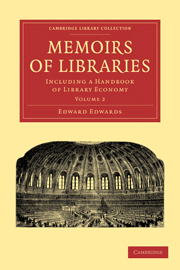Book contents
- Frontmatter
- Contents
- Chapter XV The Older Libraries of English Towns, and Their Management By Munic
- Chapter XVI The Parochial and Quasi-Parochial Libraries of England
- Chapter XVII The History of The “Public Libraries Acts” of 1850 and 1855
- Chapter XVIII The Working of The Public Libraries Acts of 1850 and 1855
- Appendix to Volume I
- Part The First. History of Libraries (Continued.)
- Book IV. The Libraries of The United States of America
- Book V. The Modern Libraries of Continental Europe
Chapter XXIV - Notices of some Existing British Private Libraries
Published online by Cambridge University Press: 29 August 2010
- Frontmatter
- Contents
- Chapter XV The Older Libraries of English Towns, and Their Management By Munic
- Chapter XVI The Parochial and Quasi-Parochial Libraries of England
- Chapter XVII The History of The “Public Libraries Acts” of 1850 and 1855
- Chapter XVIII The Working of The Public Libraries Acts of 1850 and 1855
- Appendix to Volume I
- Part The First. History of Libraries (Continued.)
- Book IV. The Libraries of The United States of America
- Book V. The Modern Libraries of Continental Europe
Summary
All that a University or final Highest School can do for us is still but what The first School began doing, —teach us to read.We learn to read in various languages, in various sciences: we learn The alphabet and letters of all manner of Books. But The place where we are to get knowledge, even Theoretic knowledge, is The Books Themselves. It depends on what we read, after all manner of Professors have done Their best for us. Tiie true University of These days is a Collection of Books.—
CAKLYLE, The Hero as Man of Letters.The Library at Bridgewater House is, I believe, one of The oldest of existing family Libraries in England. Lord Chancellor Ellesmere was its chief founder, with The advantage of possessing what remained of a collection Then already ancient; and his example was followed by The first and second Earls of Bridgewater, his immediate successors in his large possessions. For many generations it was kept at Ashridge, The noble old mansion of The thirteenth century which The Chancellor had enlarged and adorned. The distinction of demolishing The mansion, and of almost demolishing The Library (by leaving it in utter neglect, excluded even from air and light), was reserved for The “Canal” Duke, who died in 1803. The remains of The Library, still The finest Elizabethan collection which has survived, were arranged by The late Rev. H. J. Todd, with all The assiduity that could be induced by love of The task, and by his eminent attainments.
Amongst The MSS. The following are especially worthy of notice:—(1) Chaucer’s Poems,of The 15th century, on vellum, finely illuminated; (2) Gower’s Poems,also on vellum, illuminated; and The presentation copy from The author to King Henry IV. It appears to have belonged to Henry VII., prior to his elevation to The throne (The name Rychemondappears on one of The flyleaves); and was given by Thomas Lord Fairfax to Sir Thomas Gower, in 1656. By The first Duke of SuTherland (better known, perhaps, by his former title of Marquis of Stafford) some valuable additions were made to The rescued Library.
- Type
- Chapter
- Information
- Memoirs of LibrariesIncluding a Handbook of Library Economy, pp. 139 - 160Publisher: Cambridge University PressPrint publication year: 2010First published in: 1859



